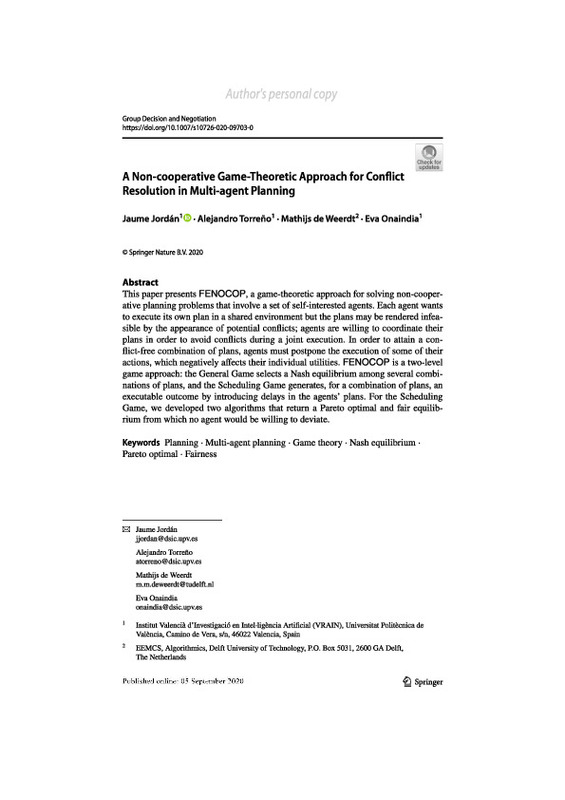Blum A, Furst ML (1997) Fast planning through planning graph analysis. Artif Intell 90(1–2):281–300
Bowling MH, Jensen RM, Veloso MM (2003) A formalization of equilibria for multiagent planning. In: Proceedings of the 18th international joint conference on artificial intelligence (IJCAI), pp 1460–1462
Brafman RI, Domshlak C, Engel Y, Tennenholtz M. Planning games. In: Proceedings of the 21st international joint conference on artificial intelligence (IJCAI), pp 73–78 (2009)
[+]
Blum A, Furst ML (1997) Fast planning through planning graph analysis. Artif Intell 90(1–2):281–300
Bowling MH, Jensen RM, Veloso MM (2003) A formalization of equilibria for multiagent planning. In: Proceedings of the 18th international joint conference on artificial intelligence (IJCAI), pp 1460–1462
Brafman RI, Domshlak C, Engel Y, Tennenholtz M. Planning games. In: Proceedings of the 21st international joint conference on artificial intelligence (IJCAI), pp 73–78 (2009)
Brandt F, Conitzer V, Endriss U, Lang J, Procaccia AD (eds) (2016) Handbook of computational social choice. Cambridge University Press, Cambridge
Buzing P, Mors AT, Valk J, Witteveen C (2006) Coordinating self-interested planning agents. Auton Agents Multi-Agent Syst 12(2):199–218. https://doi.org/10.1007/s10458-005-6104-4
Chevaleyre Y, Dunne PE, Endriss U, Lang J, LemaÎtre M, Maudet N, Padget J, Phelps S, Rodríguez-Aguilar JA, Sousa P (2006) Issues in multiagent resource allocation. Informatica 30(1):3–31
Crosby M, Rovatsos M (2011) Heuristic multiagent planning with self-interested agents. In: Proceedings of the 10th international conference on autonomous agents and multiagent systems (AAMAS), vol 1–3, pp 1213–1214
Endriss U, Maudet N, Sadri F, Toni F (2006) Others: negotiating socially optimal allocations of resources. J Artif Intell Res 25:315–348
Fikes R, Nilsson N (1971) STRIPS: A new approach to the application of theorem proving to problem solving. Artif Intell 2(3):189–208
Gal K, Procaccia AD, Mash M, Zick Y (2018) Which is the fairest (rent division) of them all? Commun ACM 61(2):93–100
Gerevini A, Serina I (2002) Lpg: a planner based on local search for planning graphs with action costs. In: Proceedings of the 6th international conference on artificial intelligence planning systems. AAAI Press, pp 13–22. http://dl.acm.org/citation.cfm?Id=3036884.3036887
Ghallab M, Nau D, Traverso P (2004) Automated planning: theory & practice. Elsevier, Amsterdam
Gillies DB (1959) Solutions to general non-zero-sum games. Contrib Theory Games 4(40):47–85
Jensen RM, Veloso MM, Bowling MH (2001) Obdd-based optimistic and strong cyclic adversarial planning. In: Proceedings of the 6th European conference on planning, pp 265–276
Jordán J, Onaindía E (2015) Game-theoretic approach for non-cooperative planning. In: Proceedings of the 29th AAAI conference on artificial intelligence (AAAI), pp 1357–1363
Komenda A, Stolba M, Kovacs DL (2016) The international competition of distributed and multiagent planners (CoDMAP). AI Mag 37(3):109–115
Larbi RB, Konieczny S, Marquis P (2007) Extending classical planning to the multi-agent case: a game-theoretic approach. In: Symbolic and quantitative approaches to reasoning With uncertainty, 9th European conference, ECSQARU, pp 731–742
McKelvey RD, McLennan AM, Turocy TL (2014) Gambit: software tools for game theory, version 13.1.2. http://www.gambit-project.org. Accessed 2 Oct 2015
Myerson RB (1981) Utilitarianism, egalitarianism, and the timing effect in social choice problems. Econometrica 49(4):883–897
Myerson RB (2013) Game theory. Harvard University Press, Cambridge
Nguyen N, Katarzyniak R (2009) Actions and social interactions in multi-agent systems. Knowl Inf Syst 18(2):133–136
Nissim R, Brafman R I (2013) Cost-optimal planning by self-interested agents. In: Proceedings of the 27th AAAI conference on artificial intelligence, pp 732–738. http://www.aaai.org/ocs/index.php/AAAI/AAAI13/paper/view/6384
Osborne MJ, Rubinstein A (1994) A course in game theory. MIT Press, Cambridge
Rawls J (1971) A theory of justice. Harvard University Press, Harvard Paperback
Sailer F, Buro M, Lanctot M (2007) Adversarial planning through strategy simulation. In: 2007 IEEE symposium on computational intelligence and games, pp 80–87. https://doi.org/10.1109/CIG.2007.368082
Shoham Y, Leyton-Brown K (2009) Multiagent systems: algorithmic, game-theoretic, and logical foundations. Cambridge University Press, Cambridge
Torreño A, Onaindia E, Komenda A, Stolba M (2018) Cooperative multi-agent planning: a survey. ACM Comput Surv 50(6):84:1–84:32
Torreño A, Onaindia E, Sapena Ó (2014) FMAP: distributed cooperative multi-agent planning. Appl Intell 41(2):606–626
Van Der Krogt R, De Weerdt M (2005) Self-interested planning agents using plan repair. In: ICAPS 2005 workshop on multiagent planning and scheduling, pp 36–44
Von Neumann J, Morgenstern O (2007) Theory of games and economic behavior. Princeton University Press, Princeton
Weerdt MD, Clement B (2009) Introduction to planning in multiagent systems. Multiagent Grid Syst 5(4):345–355
[-]







![[Cerrado]](/themes/UPV/images/candado.png)


